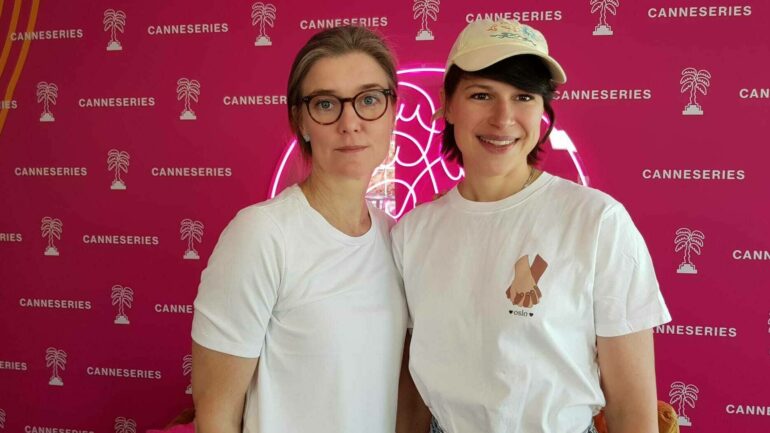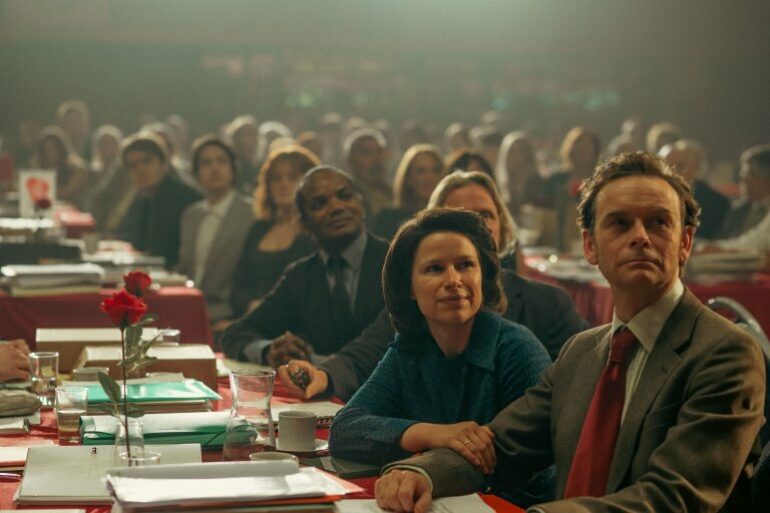Written by: Annika Pham
20.04.23
We sat down in Cannes with the creative team behind the Norwegian show Power Play which just won Best Series and Best Music at Canneseries.
Inspired by true events, Power Play (Makta) is the amazing story of Gro Harlem Bruntland, who in the late 70s, works as a doctor, fighting for self-determined abortion, and stumbles into politics.
As the Labour Party is affected by internal conflicts and the government implodes around her, she learns to play her own games of power and eventually becomes Norway’s first female Prime Minister in 1981.
The 12x55’ series was jointly created and written by Johan Fasting, (Home Ground, Ninjababy) with actresses Kristin Grue and Silje Storstein.
Yngve Sve Flikke (Ninjababy, Home Ground) serves as concept director and Kathrine Thorborg Johansen (Post Mortem-No One Dies in Skarnes, Occupied) makes a splash in the title role. We spoke to them in Cannes.
What was the starting point for the series?
Kristin Grue: In 2017, Silje and I were watching a docu series about Norwegian Prime Ministers who had been ruling the nation for the last 40 years. One of them was Gro. We thought-ohh, this is interesting! We thought how come no one has done anything about her? Borgen was such a success, so why not do something about Gro? We approached our producer Camilla Brusdal and NRK, and they loved it.
Silje Storstein: We had no experience in writing, so we approached Johan. We started researching the topic and collaborating in a writers’ room.
What views did you have of Gro Harlem Brundtland when you started working on the show?
KG: When I grew up, in the late 80s and 90s, she was Prime Minister, so it actually felt strange when a man took over the premiership after her. Silje and I have been actively involved in the #MeToo movement in Norway. We were well surrounded and started thinking of Gro, who fought in a man’s world pretty much alone.
SS: For me, Gro was like an imposing personality when I grew up, known as ‘the mother of Norway’.
Kathrine Thorborg Johansen: I didn’t know so much about Gro - just the basics. When I heard about the project and was asked to audition, I ordered a lot of books and started to read about her and the politics in the 70s. I really wanted this job. It’s a dream character and dream project because of the entire creative and production team.
Yngvild Sve Flikke: I boarded the project early as I had worked with the creators before. I’m a decade older, therefore I probably had a different approach. Gro has meant so much for my generation of women. She was a ‘doer’, as a doctor, a politician, a wife, a mother. I have two teen daughters who don’t know about Gro. Telling the story to the younger generation, about her and the Labour Party’s power struggle at the time, was very appealing to me. Showing that much hasn’t really changed - issues about abortion [in the US], the environment, political manoeuvring, felt relevant, especially for the younger audience. You just can’t take for granted what we have achieved as women.
Johan Fasting: Most Norwegian people really liked Gro, and thought she was an important figure. My initial reaction was that we would risk doing something boring if everyone was in awe of her. It would not necessarily be the most interesting premise for a drama.
That said, I was curious. I had just done Home Ground about the first woman coaching a soccer team and dealing with misogyny. It was clear for me I couldn’t just explore that theme again. I needed a new angle as well. With Power Play, there were interesting things to look at, for instance what’s behind the façade, the perception we have of Gro, not to treat her story just as a heroic journey. Yes, she is a woman, but also one of the most powerful persons in the world, sitting in a position of power. I felt we needed to approach the material with some distance and with a critical eye.
You made the story relevant to today’s political climate, as the demise of the Norwegian Labour Party and social democracy - as it was at the time - is still affecting today’s reality. On a wider level, we see populism growing and many youngsters, moving away from politics. I guess that was a wake-up call to tell people-you can make a difference….
JF: Yes I’m really happy you mention this. It was one of the main reasons why I wanted to tell the story. It can be dangerous to be disillusioned about politics. I learnt so much while researching the politics at the time. Everything went wrong and Gro was in the middle of all that mess and the power games in the Labour Party. So yes, it’s not a story about Gro, but the Labour Party, the end of an era for Norwegian social democracy. When the 80s came along, it was never the same.
YSF: It’s so important to understand why we’ve ended up where we are, and zoom out, watch the world, why we’ve become more extreme.
KTJ: The show is set at a turning point in politics, where the right wind is blowing within the Norwegian Labour Party, where the western world in general is shifting towards the right and conservatism. The series raises important questions: if we are losing our social democratic values, what will happen to our society? The rise of the far-right movements today is frightening.
It’s key for young people to understand that they have power, to engage with politics. Also, politicians sometimes are losing the grips of why they are politicians. Is it to make a difference to people’s lives, or just for them to be in power? This is why you can watch the show from different angles, and the anarchistic tone is very important.
Was Gro Harlem Brundtland involved in the series at all?
SS: It was important for us to inform her of our intention with the series, and of course, we have done a lot of research, we spoke to politicians, journalists, we’ve read everything Gro has written, but we decided not to involve her in the process. When Johan came up with the tagline ‘story based on truth, lies and bad memory’, it freed us and allowed us to make our own version of what happened, although it’s very much based on true events.
JF: Yes we wanted to keep our ability to be critical and not be afraid to be disrespectful if necessary.
Kathrine that was your biggest part ever. Could you explain how you became Gro?
KTJ: It was a long process, although again, this is not a biography, told from her perspective. The character on screen is my version of Gro. I did thorough research about her, to have more freedom once on set, to break away from her or gain from what I knew.
She is also very far away from me, even her voice is very different. I tried to emphasise some of her qualities that I find most interesting-like her enormous working capacity and energy. She is like a train! She also has a strong sense of justice. Another interesting trait of her character is that she doesn’t grab irony, but perhaps this is linked to her methodical, and pragmatic mind. These are qualities for me.
The tone is satirical, and it very much reminds us of In the Loop. Can you tell us of this particular choice?
JF: Yes we were inspired by Armando Iannucci’s In the Loop, Adam McKay‘s The Big Short, in terms of how to deal with real life material, but having fun with it and finding interesting comedic angles to present the material in an entertaining way. These were the key references. We could have made it a political thriller, but considering the absurd things that happened in real life at the time, it felt natural to use satire. Sometimes, we even felt we were writing a farce.
The series was filmed in contemporary Oslo, although the story is set in the 70s. Was this a decision made at writing stage?
JF: Yes. With our first draft, we said-OK we’re in the 70s, but the modernity is bleeding into the narrative.
KG: It is filmed in modern Oslo, but the characters don’t know this-they are in the 70s.
Yngvild, could you detail your visual style, how you used different techniques-including graphics, breaking the fourth wall, split screens, fast editing to make the show edgy, punky and move away from a political period piece?
YSF: I’ve always loved to innovate. The ‘anarchistic’ approach is something I have in my bones - I love questioning everything. With the creators, we very much agreed on the style from the inception to make it appealing to all ages. The more difficult part was to introduce the period elements. But I insisted to make it as timeless as possible. Youngsters also tend to pick the best from different periods, their tastes are fluid.
Are you looking forward to presenting the show to Norwegian audiences?
JF: Very much so. Of course, it will be different from showing it to the French audience in Cannes. In Norway, perhaps some people might be offended, but we are looking forward to people’s reactions and to stirring debates.
(the interview was edited for clarity and publication purpose).

